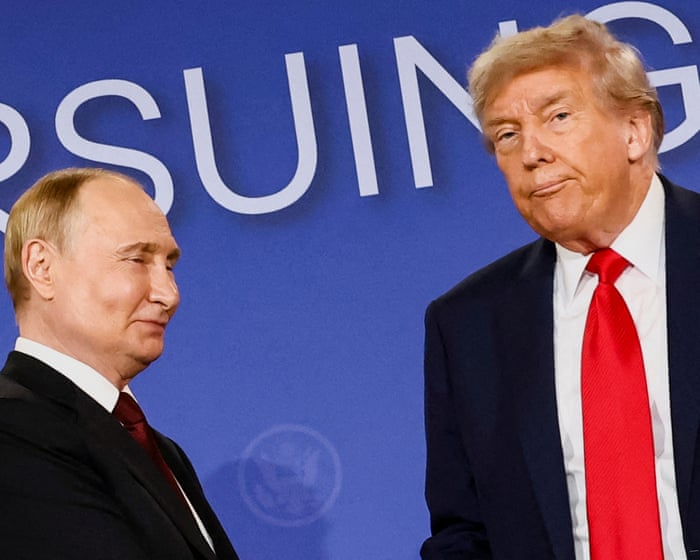Donald Trump presents himself as a tough negotiator, but his claim ahead of Friday’s summit with Vladimir Putin in Anchorage—that the Russian leader respects him and is serious about ending the war in Ukraine—seemed naive. Putin doesn’t let personal feelings dictate his political or military decisions. He still insists on Russia’s claim to four Ukrainian provinces: Donetsk and Luhansk in the eastern Donbas region, and Zaporizhzhia and Kherson in the south. Despite Russia’s overwhelming military advantage, Putin has only fully secured one province, Luhansk. Yet he refuses to back down.
Before meeting Putin, Trump argued that Russia’s struggling economy—plagued by inflation, labor shortages, and dwindling oil revenues—would force Putin to reconsider the war. But economic pressure hasn’t changed Putin’s strategy. He ignored Trump’s proposed 30-day ceasefire, which Ukrainian President Volodymyr Zelenskyy quickly accepted. He also shrugged off Trump’s threats of new sanctions if Russia didn’t relent.
The summit itself was rushed, with little groundwork laid in advance. Talks ended early, and the planned working lunch was canceled. At his press conference afterward, Trump praised Putin’s goodwill and called the discussions “productive,” but he couldn’t name a single concrete agreement—and unusually, he left without taking questions.
Putin emerged as the clear winner. He rejected Trump’s ceasefire proposal and instead pushed for a broader peace deal addressing the war’s “root causes”—a stance Trump ultimately accepted. Putin did offer a partial concession: a frontline freeze if Ukraine withdrew from Donetsk and Luhansk, effectively ceding the entire Donbas to Russia. But this could be a trap. If Zelenskyy—who meets Trump in Washington on Monday—refuses, Putin may watch as Trump pressures Ukraine, forcing Europe to pick sides. If Trump fails, Putin can blame Zelenskyy for blocking peace.
Despite Trump’s earlier vow that no further talks would happen if the summit failed, he now speaks of follow-up meetings. Putin agreed, even suggesting Moscow as the next venue—but with no mention of including Zelenskyy or European leaders. By keeping negotiations alive, Putin may have stalled any new U.S. sanctions.
Simply by attending the summit, Putin proved that Western efforts to isolate him won’t work. While Zelenskyy and European leaders may be relieved that no deal was struck to partition Ukraine, Trump’s willingness to meet Putin one-on-one—after failing to include Zelenskyy—has deepened distrust between Washington and its allies.Trump has now adopted Putin’s stance that a ceasefire is only possible with a comprehensive agreement addressing all aspects of the conflict. He has also effectively backed Putin’s demand for Ukraine to surrender the Donbas region in exchange for freezing the current frontline. These changes will deepen Ukraine and Europe’s distrust of Trump—playing directly into Putin’s hands.
Russia is celebrating after the Trump summit, where Putin reportedly insisted on keeping Donetsk and Luhansk. Putin’s confidence in Russia’s eventual victory has grown since Trump decided—long before the summit—to halt direct weapons shipments to Ukraine, which had totaled $65.9 billion under Biden. Russia will keep bombing Ukrainian cities, and its troops will continue advancing to seize more territory. In that sense, the summit changed nothing.
What has shifted since Trump returned to the White House is America’s role in the war. Trump believes Russia’s invasion doesn’t threaten the U.S., so Europe should take the lead in supporting Ukraine—a point JD Vance echoed just before the summit. European nations have already ramped up defense spending and military aid to Ukraine, but they must prepare to do even more and maintain unity in the long run.
Meanwhile, Trump clings to the illusion that further talks with Putin—combined with his self-proclaimed deal-making prowess—will somehow end the war, paving the way for the Nobel Peace Prize he so desperately wants.
Rajan Menon is a professor emeritus of international relations at the City College of New York and a senior research scholar at Columbia University’s Saltzman Institute of War and Peace Studies.
FAQS
### **FAQs About “Putin Wins in Anchorage: Now Zelenskyy and Europe Face Greater Danger” by Rajan Menon**
#### **Beginner-Level Questions**
**1. What is the article “Putin Wins in Anchorage” about?**
The article discusses the geopolitical implications of a Russian victory in Anchorage and how it increases dangers for Ukraine’s President Zelenskyy and Europe.
**2. Who is Rajan Menon?**
Rajan Menon is a political scientist and expert on international relations, often writing about Russia, Ukraine, and global security.
**3. Why does Putin’s victory in Anchorage matter?**
It suggests a shift in global power dynamics, strengthening Russia’s position and posing greater threats to Ukraine and European security.
**4. How does this affect Ukraine and Zelenskyy?**
A stronger Putin could mean more aggressive actions against Ukraine, making Zelenskyy’s defense efforts harder and increasing risks of further conflict.
**5. What danger does Europe face?**
Europe may see increased Russian aggression, energy instability, and potential military threats, requiring stronger NATO responses.
—
#### **Advanced-Level Questions**
**6. Is “Anchorage” a real place in this context, or symbolic?**
It’s likely symbolic or hypothetical, representing a strategic win for Putin, rather than a literal battle in Alaska.
**7. How does this scenario impact NATO’s role?**
NATO may need to reinforce defenses, increase military support for Ukraine, and deter further Russian expansion.
**8. Could this lead to a larger war in Europe?**
Yes, if Russia feels emboldened, it could escalate conflicts, potentially drawing in NATO and leading to a broader war.
**9. What are the economic consequences for Europe?**
Energy prices could rise, trade disruptions may occur, and defense spending might increase, straining economies.
**10. How should the U.S. respond to this situation?**
The U.S. might need to boost military aid to Ukraine, strengthen NATO alliances, and impose tougher sanctions on Russia.
**11. Does this mean Putin is winning the war in Ukraine?**
Not necessarily, but a symbolic victory could signal momentum, making Ukraine’s resistance harder.



